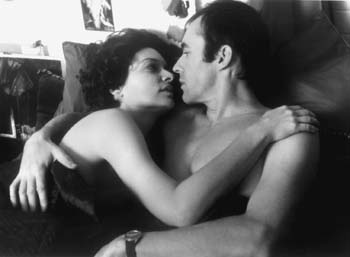Jaglom's Brooch of Trust
Destiny unites two New Age boors in Henry Jaglom's shriveled 'Déjà Vu'
By Michelle Goldberg
HENRY JAGLOM'S Déjà Vu is a silly romance with gorgeous scenery that shrivels under the weight of its intellectual pretensions. The moral of the film seems to be "Follow your bliss, no matter who gets hurt"--not necessarily an indefensible proposition, but one that needs a lighter touch than Jaglom's in order to come off as more than hand-wringing yuppie rationalization.
The action begins in Jerusalem, where an American woman named Dana (Victoria Foyt) is traveling on business. At a seaside cafe, she meets an older Frenchwoman who tells her the sad story of a failed love affair, then goes to the bathroom and never returns, leaving behind a brooch with immense sentimental value.
Moved by her story, Dana goes to Paris to attempt to return the pin. Failing to find the mysterious woman, Dana travels to the cliffs of Dover, where she meets Sean (Stephen Dillane), an artist and architect with whom she immediately feels a mystical, irrepressible (and mutual) connection. At least that's what they keep saying in ever more florid and painfully earnest ways, their language rendered increasingly awkward by the laughable lack of chemistry between them.
Destiny in Déjà Vu is about as subtle as it is in James Cameron movies, and Dana and Sean are slammed back together soon after they part. Unfortunately, the second time they meet--they're both guests at the same house in London--Dana is with her boorish fiancé and Sean is with his wife.
At the house, the invisible hand of fate keeps pushing them toward each other, but both are reluctant to disrupt their stable, relatively happy long-term relationships. In a series of civilized conversations held in front of the fireplace, everyone natters on about the meaning of love, happiness, security and serendipity. Baldly representing two philosophical poles are Skelly (Vanessa Redgrave), a Bohemian world traveler, and her bourgeois sister-in-law, Fern (Anna Massey), who's comfortably married to Skelly's brother, John (Noel Harrison). Skelly advises Dana, "Don't cling forever to the same person," while Fern instructs, "All of life's a compromise. Otherwise it's a roller coaster, and you can fall off at any moment."
But the film doesn't really create a dialectic between nesting and flying free, because the deck is too stacked in favor of Dana and Sean's supposedly grand passion. Even the most diehard romantics will likely be irritated by the characters' New Agey immorality. After Dana and Sean sleep together, he turns to her and quotes Kierkegaard, "To cheat oneself out of love is the most terrible deception." Actually, one is tempted to scream, To cheat on your wife after asking her to have your baby is a bit worse.
What really ruins the film, though, is Foyt's grotesquely insipid performance. Foyt is Jaglom's wife (she also co-wrote the script), and maybe Jaglom was too blinded by love to understand how implausible it is to watch two perfectly normal men fight over the cloying, neurotic Dana. At one point she and her fiancé disagree about a vase, and she screeches at him with nearly comic fury, "You have no sense of aesthetic, Alex!" Sean, of course, loves the vase. Ah, destiny!
[ San Jose | Metroactive Central | Archives ]
![]()

Embraceable You: Despite all the petty odds (like being married to other people), Victoria Foyt and Stephen Dillane are made for each other in 'Déjà Vu.'
Déjà Vu (PG-13; 115 min.), directed by Henry Jaglom, written by Jaglom and Victoria Foyt, photographed by Hanania Baer and starring Victoria Foyt and Stephen Dillane.
From the May 21-27, 1998 issue of Metro.
![[Metroactive Movies]](/movies/gifs/movies468.gif)